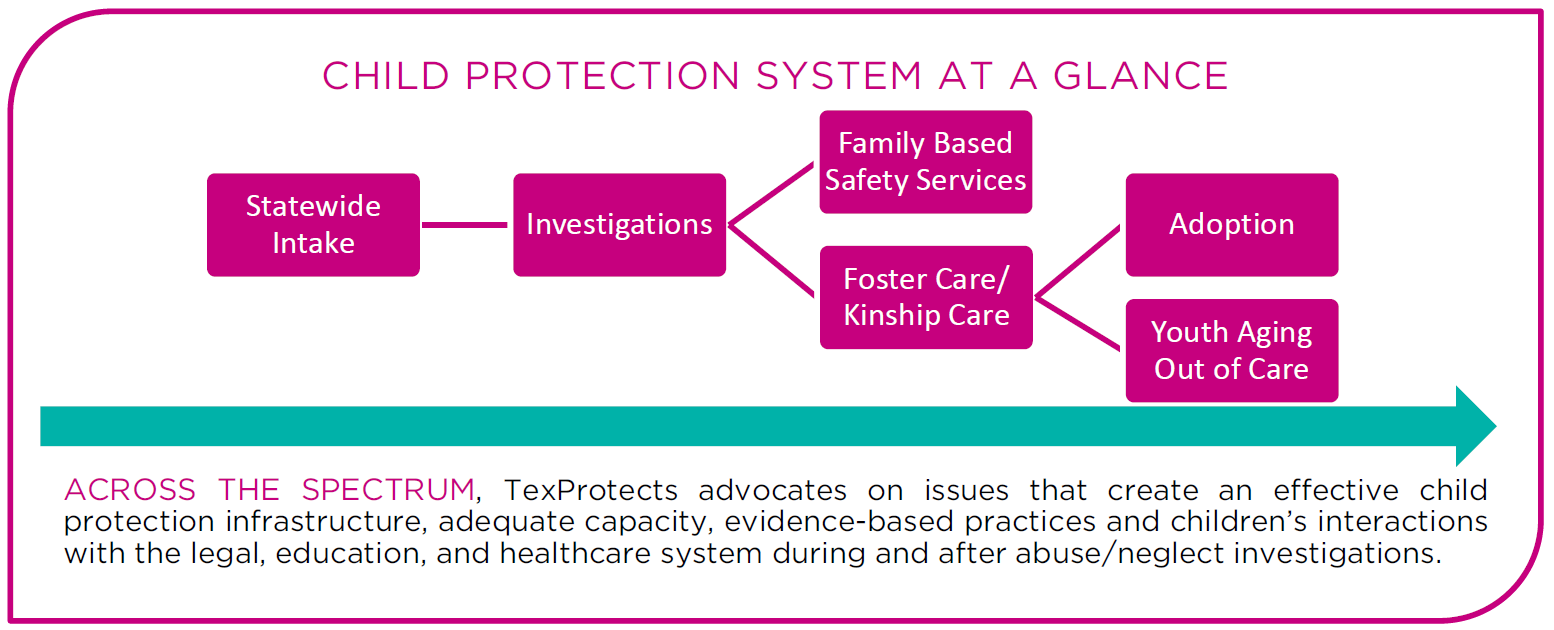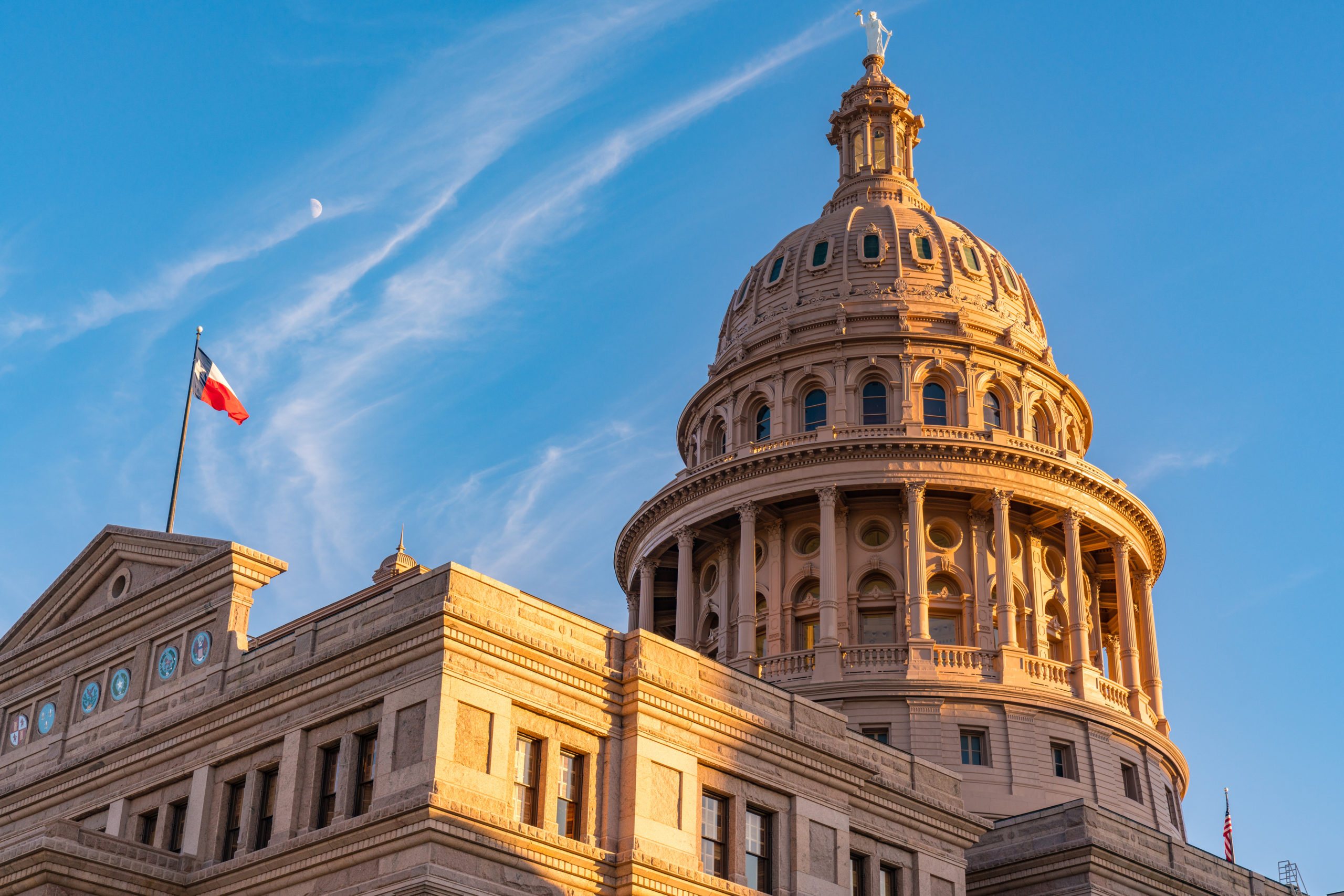DID YOU KNOW?
- In 2018, there were 280,874 reports of suspected child abuse/neglect to Statewide Intake. 66,370 or 24% of those reports were confirmed.
- Child maltreatment will cost Texas an estimated $1.75 billion in CPS expenditures in FY 2019 and over $55 billion in total costs across the victims’ lifetimes.
- 43% of children who complete Family Based Safety Services programming with their families are reconfirmed as victims of abuse within 5 years.
Welcome to the third part of our look at how child protection legislation fared in the 86th Texas Legislature. We began this series in May with our top-priority bills., followed by an examination of prevention and early intervention legislation.
Today’s post looks at bills affecting Child Protection Systems, and next we will conclude with Mental Health and Trauma. For a PDF version of this post, click here.
Child Protection Systems Background
In the 85th Texas Legislative Session (2017), Governor Greg Abbott declared child protection to be an emergency item. That session resulted in unprecedented child protective services (CPS) reforms and investments including:
- Increases in kinship care through enhanced financial assistance;
- Expansion of community-based foster care;
- Treatment-based foster family care in most regions;
- Salary increases; and
- Additional hires that lowered caseloads
While those reforms made real progress for the safety of Texas children, there was significant work left to do in the 86th Legislative Session (2019) and much less political will to do it. However, opportunities for continued investment in best practice and improvements to child safety were plentiful. Opportunities presented to the 86th Legislature included:
- Maintenance – In order to maintain the salary increases, caseloads, and investments in community-based care despite a growing child population and increasing number of child abuse reports and victims, lawmakers had to invest additional dollars or risk losing ground on the changes made last session.
- Pressure from the federal class action lawsuit – In 2015, Judge Janis Jack proposed significant changes to the CPS system to ensure the constitutional rights and due process of children in the care of the state in response to a class action lawsuit filed on behalf of 12,000 children in long-term foster care. While some of the proposals were overturned by the 5th Circuit Court of Appeals as overreach, the findings have consistently made clear that the state has work to do to ensure the safety, health, and constitutional rights of children in the conservatorship of the state.
- Family First Prevention Services Act – This session presented a new opportunity to leverage federal funds made available through the federal Family First Prevention Services Act in two significant ways. First, it makes available new prevention funding to help strengthen families before a crisis by investing in mental health, substance use prevention and treatment, and in-home parenting programs. Second, it requires that federal dollars for children in care be spent on family-like settings and treatment centers that are offering accredited and high-quality care. In order to leverage those dollars most effectively, the Legislature had the opportunity to invest in planning and improved quality that would ready the state for implementation.

Child Protection in the 86th texas legislature
Top-Priority Bills Passed
House Bill 1 – The General Appropriations Act
Champions: Sen. Jane Nelson, Sen. Lois Kolkhorst, Rep. John Zerwas, REp. Sarah DAvis
General Overview – Although we did not see the urgent and comprehensive focus on child welfare this session that we did in the 85th, there was continued attention on child protection issues. Lawmakers viewed their role this session as one of a gatekeeper – ensuring that the large-scale changes of last session continued to move forward and that implementation was monitored closely. Despite a cut in state funds, when federal funds were included, the Department of Family and Protective Services (DFPS) budget grew by 6.1%. In their budget, lawmakers showed continued support for community-based care, increasing the use of kinship care, and the needs of older foster youth.
| Area of Budget | 2020-21 Base Budget | House Bill 1 FINAL | % Difference |
|---|---|---|---|
| Child Protective Services | $3.7 billion | $3.8 billion | 2.2% + |
Statewide Intake – At DFPS, statewide intake is the front door for the public to report suspected abuse. Additional investments will improve child safety by minimizing hold times on the statewide intake line. Long wait times can result in dropped calls and increase the risk of abuse going unreported. Investments in this biennium will support salary increases of $6,000, resulting in lower turnover and subsequently, a higher level of experience in the workforce.
| Area of Budget | 2020-21 Base Budget | Additional Investment & House Bill 1 Final | % Difference |
|---|---|---|---|
| Statewide Intake | $45.9 million | $4.3 million $50.2 million total | 8.5% + |
Caseloads – The maintenance of manageable caseloads is paramount to ensuring the safety of children who are interacting with the child protection system. Investments for CPS direct delivery staff will help to maintain lower caseloads per worker for most caseworkers.
| Area of Budget | 2021 Base Budget & Average Daily Caseload | Additional Investment, House Bill 1 Final, & Projected Average Daily Caseload | % Difference |
|---|---|---|---|
| CPS Direct Delivery Staff | $1.4 billion | $148 million $1.6 billion total | 9.1% |
| CPS Investigations | 13.6 cases | 13.6 billion | |
| CPS Family Based Safety Services | 10.2 cases | 9.3 cases | |
| CPS Conservatorship | 25 cases | 23.5 cases |
Projected caseloads are included in HB 1 and are estimates from the Legislative Budget Board; DFPS will prepare its own analysis.
Community-Based Care – The Legislature provided funding to continue rolling out Community-Based Care (CBC), formerly named “Foster Care Redesign,” which changes the way the state delivers foster care services. Under CBC, a private contractor (called a “Single Source Continuum Contractor [SSCC]”) is responsible for building and managing foster care capacity and placements for a specific service region in the state. CBC has been rolled out in Region 3B (seven-county area including Tarrant County), Region 2 (30-county area in North and North-central Texas that includes Wichita Falls and Abilene) and Region 8A (Bexar County). Additional investments this session will provide resources to expand into Region 8B (16 counties surrounding Bexar), and Region 1 (41 counties in Panhandle), as well as add case management work to the existing contracts.
| 2020-21 Base Budget | Additional Investment and House Bill 1 Final | % Difference | |
|---|---|---|---|
| Community-Based Care | $434.5 million | $66.9 million $501.4 million total | 15.4% +0 |
Foster Care Provider Payments – Foster care families and other providers are essential to building capacity in the foster care system so it meets the current demand, as well as ensuring positive outcomes for children and youth in conservatorship of the
state. The Legislature provided additional investment of $12 million in foster family support, certain residential providers and emergency shelters.
Supervised Independent Living (SIL) and Preparation for Adult Living (PAL) – DFPS provides both SIL and PAL programs to assist older youth in their transition toward a successful and self-sufficient adulthood. Without supportive housing and access to training and resources, youth are more likely to be involved in the criminal justice system, are at higher risk of teen pregnancy, have lower high school graduation rates and are more likely to experience homelessness and unemployment. SIL increases of $1.8 million will support case management services for children with more complex needs and increase the rates paid to providers for services. PAL increases of $1.5 million will support 10 additional specialist positions.
HB 475
Champions – Rep. Donna Howard and SEn. Kirk Watson
HB 475 will ensure that pregnant and parenting foster youth receive basic information about ways to keep their child safe and promote healthy attachment, child development, and maternal health if they cannot or choose not to participate in Project Helping through Intervention and Prevention (HIP). Project HIP makes available evidence-based, in-home parenting programs to pregnant and parenting foster youth; however, it is voluntary and not currently available statewide.
Other Priority Bills Passed
TexProtects Goal – Efficiency and Best Practices in CPS and Foster Care
Senate Bill 195 – Sen. Charles Perry / Rep. Tan Parker
SB 195 requires DFPS to update their case tracking system to allow DFPS to keep statistics regarding alcohol and controlled substances when funds are available. This detailed information will allow the department to better understand the correlations between substance use and child abuse/neglect as well as the impacts of prenatal exposure to alcohol and controlled substances on children.
SB 781 – Sen. Lois Kolkhorst / Rep. Ben Leman
SB 781 will establish regulations for child safety, runaway prevention, quality contracting, and strategic planning for facilities that provide 24-hour care to children such as residential treatment centers and emergency shelters. The strategic plan outlined in the bill will help ensure that state agencies are prepared for the implementation of the federal Family First Prevention Services Act.
TexProtects Goal – Increased Use of Kinship Care
HB 1884 – Rep. Ina Minjarez / Sen. Carol Alvarado
HB 1884 requires that when a child is placed with a relative or other designated caregiver, the caregiver is informed, by the court, of the option to become verified by a licensed child-placing agency and of the permanency care assistance program. This opportunity can make available additional resources to the caregiver and as a result, increase stability for children.
HB 3390 – Rep. Scott Sanford / Sen. Angela Paxton
HB 3390 ensures that adequate steps are taken to identify any potential caregiver for a child before that child is placed in foster care. The bill also expands the definition of a designated caregiver to include a person who had a longstanding and significant relationship with the family of the child and requires that the child and parent both be asked to share any relatives or potential caregivers.
TexProtects Goal – Improved Services to Foster Youth Aging Out of Care
HB 53 – Rep. Ina Minjarez / Sen. Beverly Powell
HB 53 will require DFPS to collaborate with the Office of Consumer Credit Commissioner and the State Securities Board to develop an expanded financial literacy education program for foster youth. Experiential training will include filing taxes, using insurance, identity and credit theft, budgeting and civic engagement.
HB 123 – Rep. James White / Sen. Kirk Watson
HB 123 eases the burden of obtaining personal identification documents for foster children by waiving the fee, exempting the requirement for a parent signature and allowing the use of the DFPS regional office in lieu of a permanent address.
HB 1702 – Rep. Donna Howard / Sen. Kelly Hancock
HB 1702 requires institutions of higher education to make publicly available the contact information for their foster care liaison officer and information regarding support services available to students who were formerly in conservatorship. In addition, the name of any student who was formerly in conservatorship will be provided to the foster care liaison officer by their institution at the beginning of each semester.
TexProtects Goal – Cross-Sector Collaboration and Child Protection Systems
HB 72 – Rep. James White / Sen. Angela Paxton
HB 72 allows adopted children with chronic health conditions to continue to have access to the healthcare they would have had if they had remained in conservatorship if the adoptive parents opt-in. Foster children who transition into adoptive placement often experience gaps in medical care, and these gaps can have serious negative health consequences for children with severe disabilities.
HB 621 – Rep. Victoria Neave / Sen. Judith Zaffirini
HB 621 expands existing statutory protections against employer retaliation for a professional’s good faith reporting of child abuse or neglect by defining “adverse employment action” to mean any action that affected an employee’s compensation, promotion, transfer, work assignment, or performance evaluation, or any other employment action that would dissuade a reasonable employee from making or supporting a report of abuse or neglect.
HB 1709 – Rep. Mary González / Sen. José Menéndez
HB 1709 requires school districts to work closely with DFPS to notify when a surrogate parent has been appointed to a child with disabilities who is in conservatorship. Surrogate parents are appointed by school districts when children with disabilities who are under the managing conservatorship of DFPS do not have an available parent or foster parent who is willing or able to serve as the educational decision maker for the child. When a court-appointed surrogate parent is not properly performing their required duties, the district must consult with DFPS to review the appointment and, if appropriate, find a replacement. This bill expands the definitions of who can serve as a surrogate parent and helps ensure transparency and accountability in the system.
HB 1780 – Rep. Rick Miller / Sen. Lois Kolkhorst
HB 1780 requires the court to consider a parent’s good faith attempt to complete a drug rehab program when deciding whether to grant a 6-month extension before terminating parental rights. In light of the overwhelming majority of neglectful supervision cases that involve substance use and the complexity of treatment and recovery, this bill will give parents a chance to break the cycle of drug addiction and keep families together.
HB 2229 – Rep. Jarvis Johnson / Sen. Kirk Watson
HB 2229 adds specific information to a report the Texas Juvenile Justice Department (TJJD) must submit to the Governor, Lt. Governor, and Legislature every even numbered year regarding foster children in the juvenile justice system. This bill requires the report to break down the number of foster children in TJJD custody by age, sex, race, conduct, and first-time offenders. This data will enable advocates and policymakers to better implement programs and practices that can prevent foster youth from entering the justice system.
HB 2737 – Rep. Gene Wu / Sen. Nathan Johnson
HB 2737 will require the Texas Supreme Court to provide annual guidance to judges who preside over juvenile or child protective services cases to establish greater uniformity across the state in how those cases are handled. The issues addressed could include the placement of children with severe mental health issues; changes in placement; final termination of parental rights; release of children detained in
juvenile detention facilities; certification of juveniles to stand trial as adults; and commitment of children to the Texas Juvenile Justice Department.
HB 3809 – Rep. Craig Goldman / Sen. Kirk Watson
HB 3809 will allow suits for personal injury to be brought up to 30 years after the day the cause of action accrued if the injury arose from conduct involving offenses against children including sexual assault of a child, aggravated sexual assault of a child, continuous sexual abuse of a young child, trafficking a child and causing the child to be involved in certain sex crimes, compelling prostitution of a child, and indecency with a child. Currently, the statute of limitations is 15 years. This bill allows more time for child victims to come to terms with their trauma enough to talk about it and bring a civil lawsuit.
Missed Opportunities for Improving Child Protection Systems
Rate Increases

Children who cannot remain safely at home with their parents are removed by CPS. CPS places children in foster care placements when a suitable kinship option is not available. Foster care services may be provided through placement with foster families or through emergency shelters, residential treatment centers, and other programs. Foster care providers are reimbursed by the state at a daily rate based on the type of care that is required to meet the needs of each child. In Texas, these rates do not fully cover the cost of providing foster care services, and providers must secure philanthropic donations that subsidize the rates in order to provide quality foster care. While lawmakers did make some investments in rate increases, in most cases these increases did not keep pace with inflation and actual purchasing power decreased. Insufficient rates contribute to continuing problems in building sufficient capacity to serve children in need.
Trauma-Informed Care

Children who are interacting with the Child Protection System experience trauma at higher rates than their peers and often in patterns that are complex and chronic. Although DFPS currently includes trauma-informed training in programs made available to DFPS employees as well as foster, adoptive, and kinship caregivers, the comprehensiveness and accessibilty of that training may not be sufficient to ensure staff and caregivers have the skills they need to recognize and address the ways that trauma may be affecting a child’s behavior. Unfortunately, the Legislature failed to take action to ensure that the adults who are charged with decision making on behalf of traumatized children, have adequate training to understand the ways trauma can impact biology and behavior or strategies to increase resilience and healing.
Funding for Increased Quality in Foster Care

The Family First Prevention Services Act, which will go into effect in 2021, targets federal funding to evidencebased foster care prevention services and improved foster care that provides the best environment for each child’s unique needs. For children with therapeutic needs, Family First dollars are available for providers who have thirdparty assessment, access to medical staff, and follow-up after transition to assure successful placement. Many Texas providers are not currenly meeting the standards laid out by the bill. This session offered an opportuntiy to invest in programs and services that are being prioritized by Family First so that implementation will be efficient, federal dollars can be maximized, and children will have access to higher quality care.



